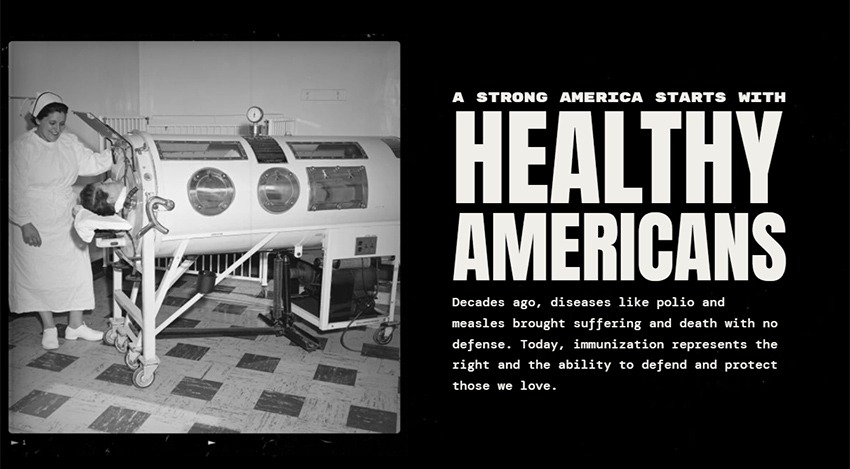Now that vaccines have all but eliminated smallpox, measles, polio, and other childhood scourges in the U.S., it seems easy to forget that these diseases once killed or paralyzed millions.
But forgetting to maintain vaccine vigilance would be a deadly mistake. That’s the motivation for the Biotechnology Innovation Organization (BIO) to start its “Invest in America. Vaccinate.” awareness campaign.
With clear messaging, and images from a recent, less healthy past, the campaign’s website offers a reminder of the need for vaccination at a time when we’re seeing a rise in completely preventable illnesses.
“Decades ago, diseases like polio and measles brought suffering and death with no defense. Today, immunization represents the right and the ability to defend and protect those we love,” says the site. “But a growing group is letting preventable infectious diseases make a comeback.”
As of April 25, there were 11 measles outbreaks in the U.S. and 884 cases, nearly all among people who were unvaccinated or had unknown vaccination status, according to the Centers for Disease Control and Prevention (CDC).
Seventy percent of the cases were among children, and they caused 85 hospitalizations and two confirmed deaths, with a third death under investigation, the CDC said. CDC scientists said on April 21 that recent cases in Texas, Oklahoma, and New Mexico comprise the worst single outbreak since 2000, when measles was officially declared eliminated in the U.S.
The need for good information
The CDC recommends that all children receive two doses of the measles-mumps-rubella (MMR) vaccine, one by 15 months and a second by age 6.
Unfortunately, measles vaccine numbers have lagged since the COVID pandemic. A poll released April 23 by KFF indicates that misinformation causing doubts about vaccines may be a factor.
“When it comes to false claims that the MMR vaccines have been proven to cause autism, that vitamin A can prevent measles infections, or that getting the measles vaccine is more dangerous than becoming infected with measles, less than 5% of adults say they think these claims are ‘definitely true,’ “ KFF says. “However, at least half of adults are uncertain about whether these claims are true or false.”
BIO’s “Invest in America. Vaccinate” campaign aims to remove uncertainty about the benefits of vaccines.
“Vaccines have worked so well that many people have never seen these preventable diseases before,” according to Sean Clements, who helped develop the site for BIO. “We’ve reached a time where people need to be reminded of the value of vaccines—and warned against going backwards.”
The website provides reminders of the time before vaccination and states essential facts:
- Smallpox and polio were eradicated in the U.S. and the last case of respiratory, diptheria was in 1997, largely due to universal vaccination against the diseases.
- Whooping cough (pertussis) has been reduced by 83% between the time the vaccine became available in 1948 and 2024.
- Millions of lives have been saved since a global vaccinee campaign began 50 years ago and 508 million illnesses have been prevented between 1994 and 2023 through the CDC’s Vaccines For Children Program..
BIO’s Why We Vaccinate website will grow and develop,and given the urgency of the messaging, BIO may consider expanding the campaign into states where more immunization education is needed, according to Clements.
“We’re just at a very important inflection point for immunization in this country,” he says. “So it’s vital to provide this education.”




